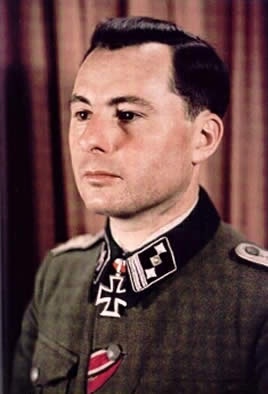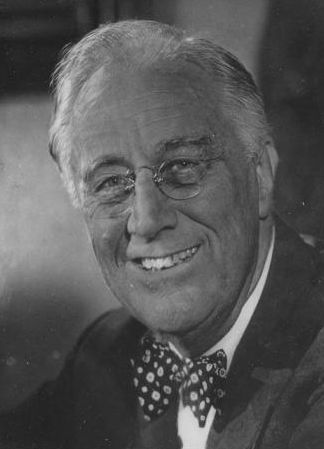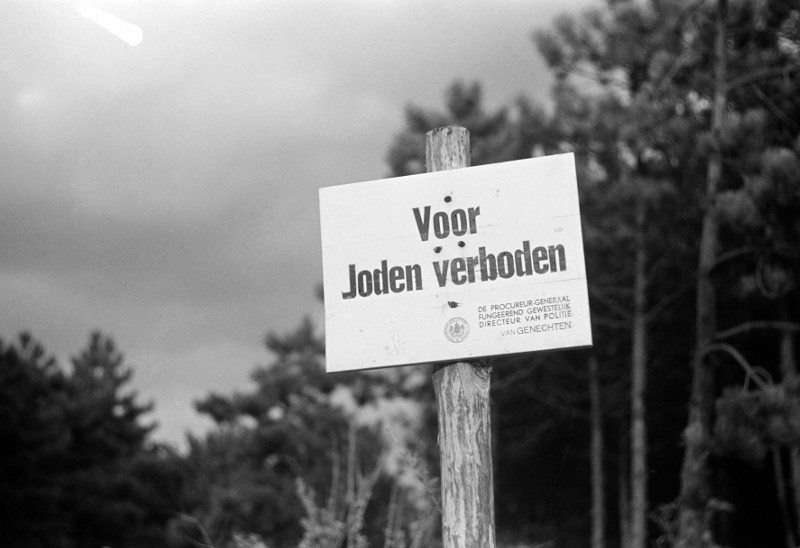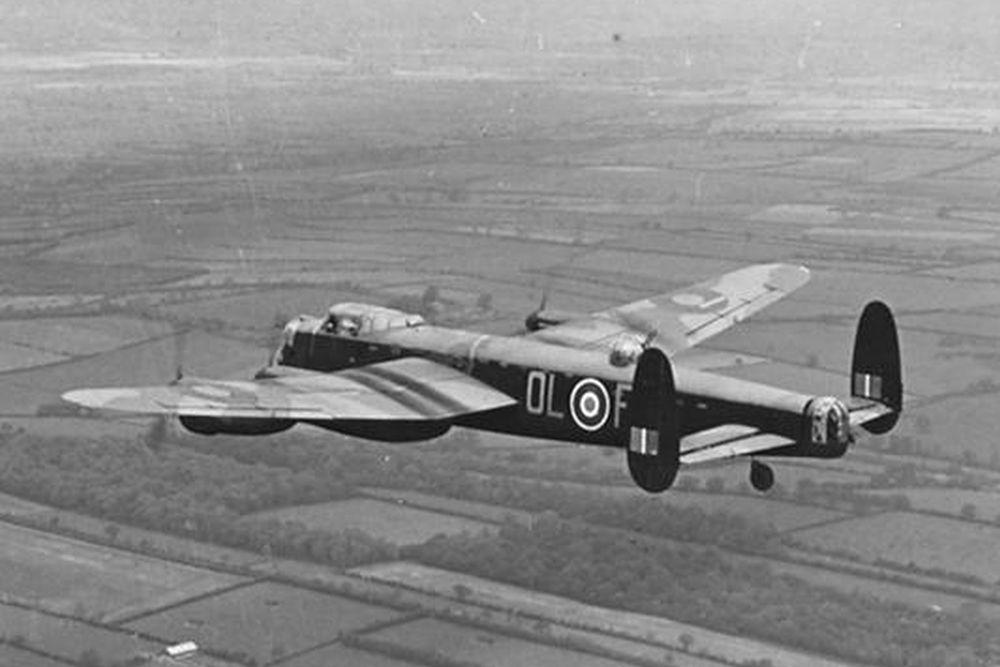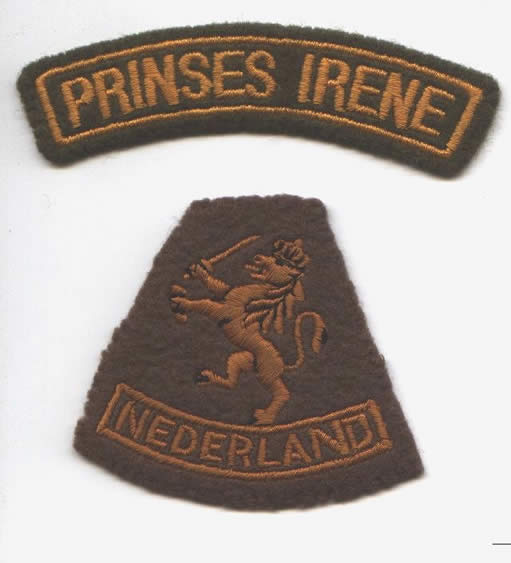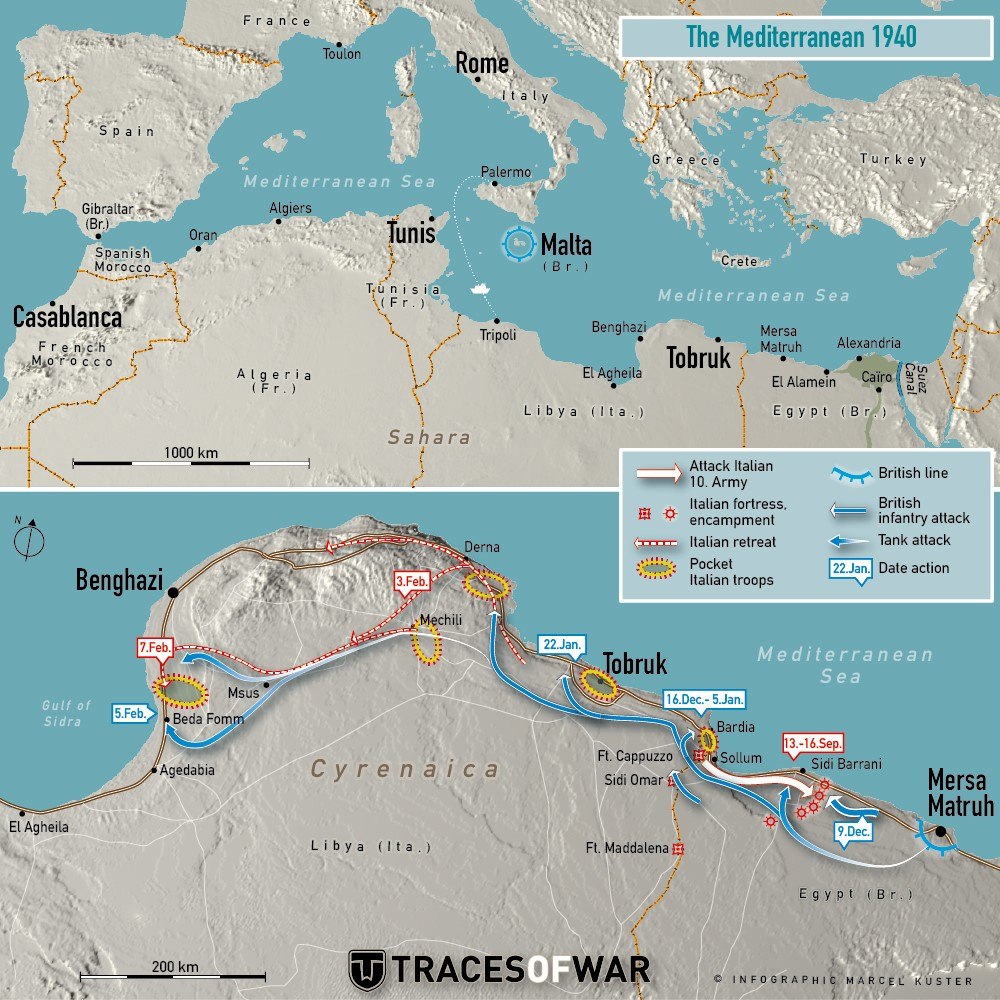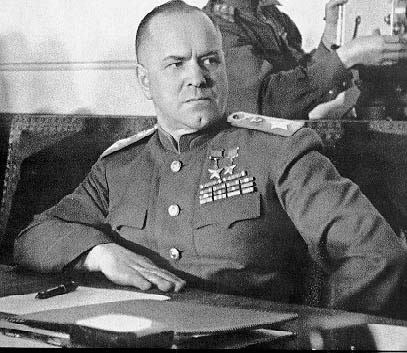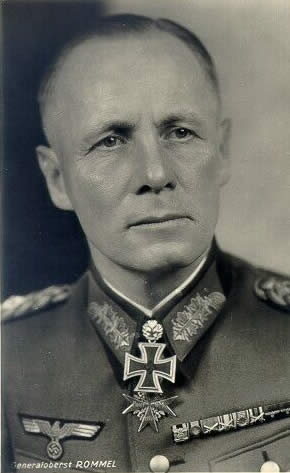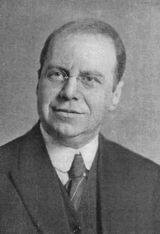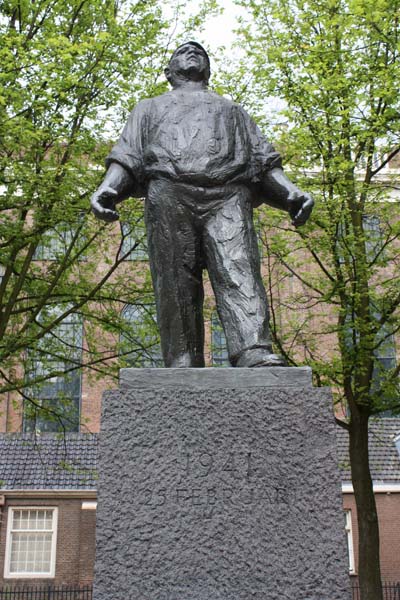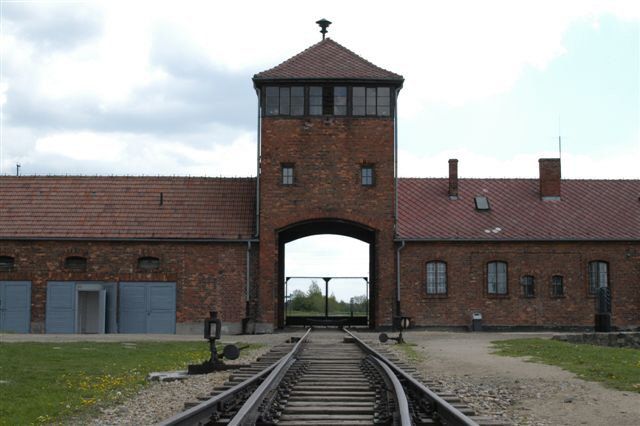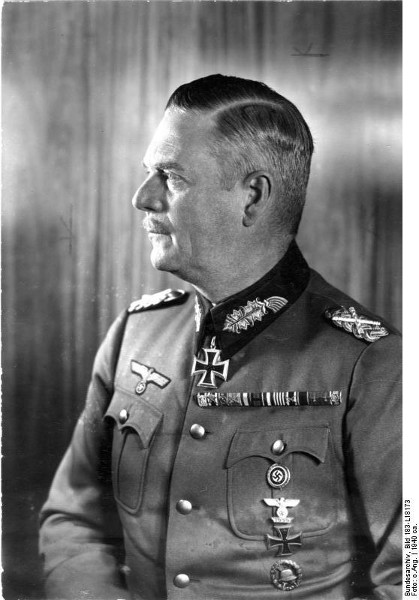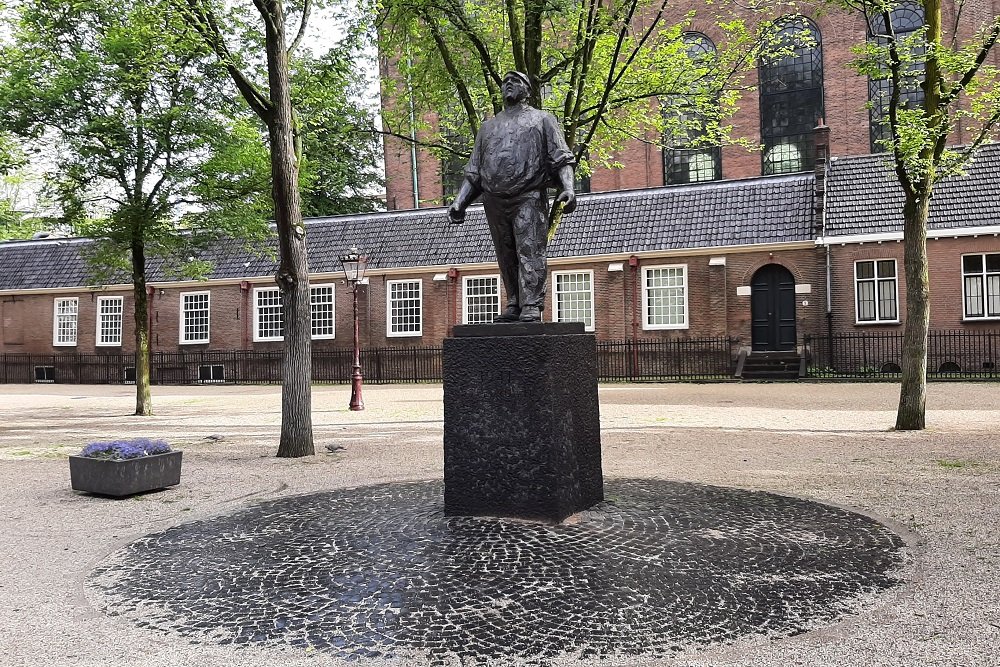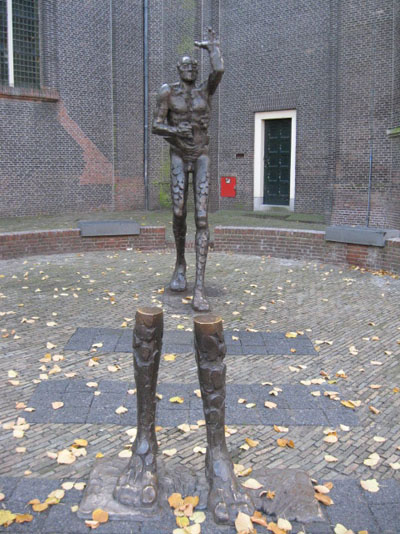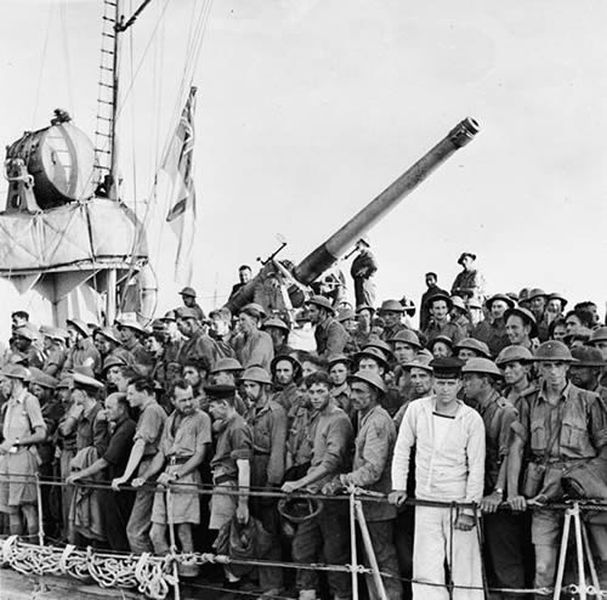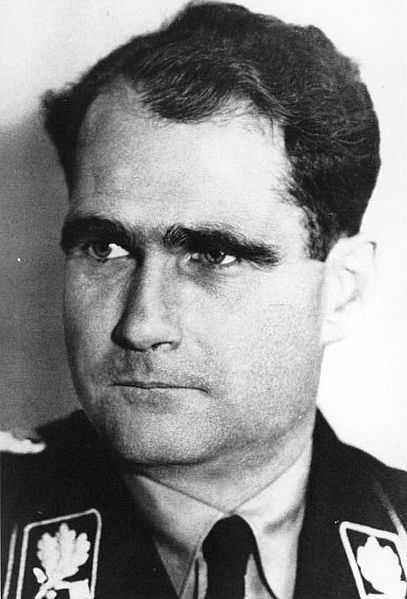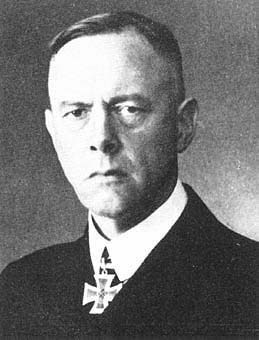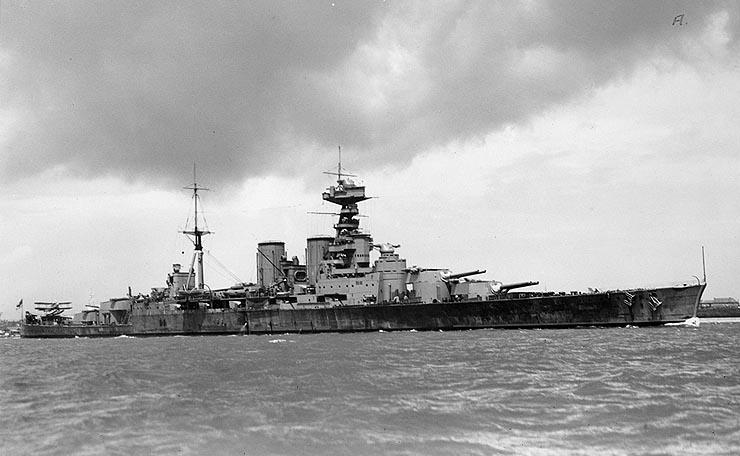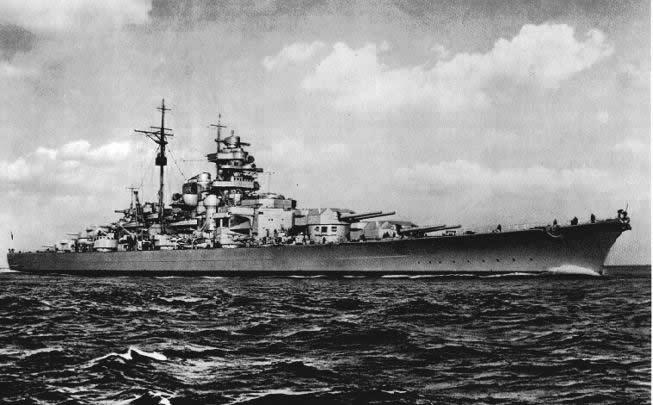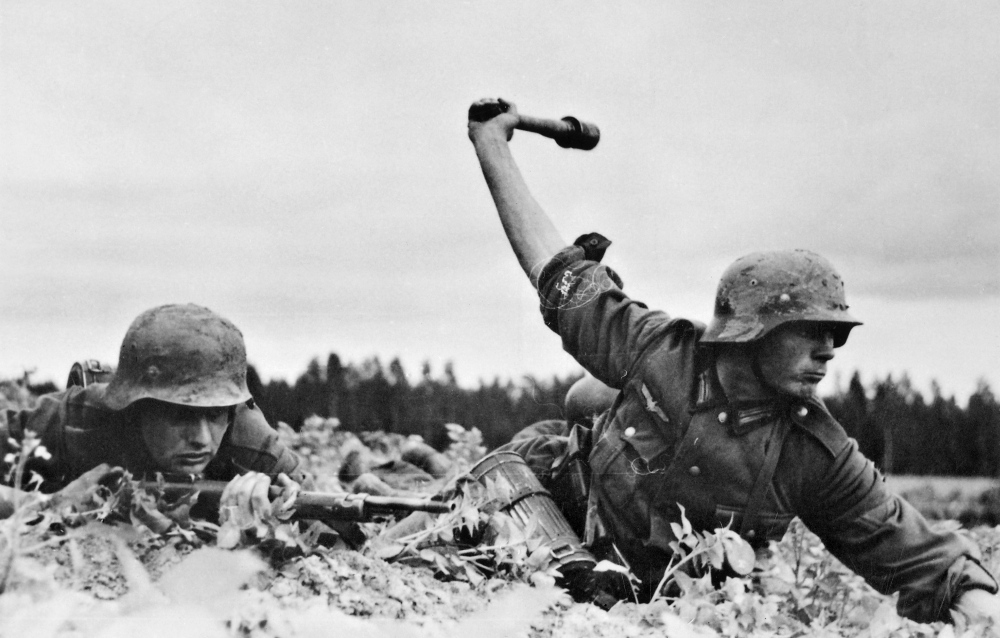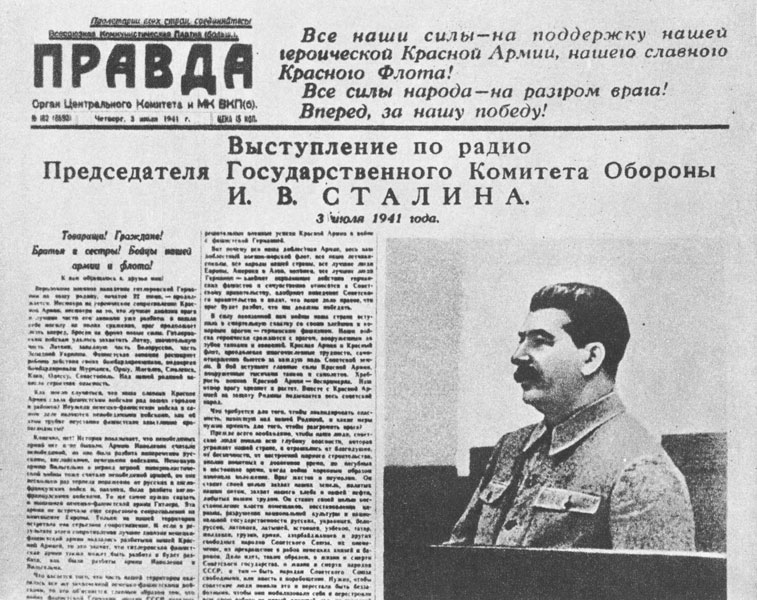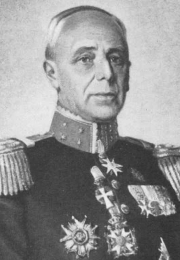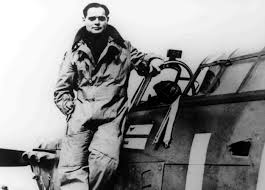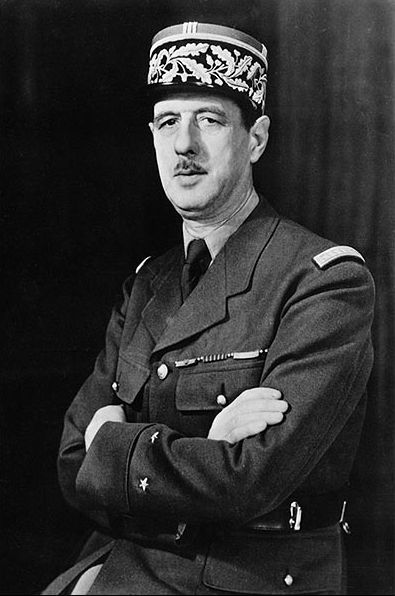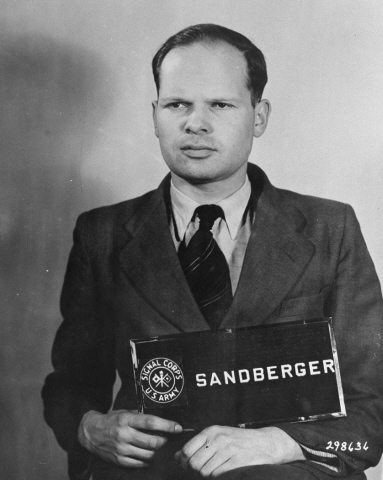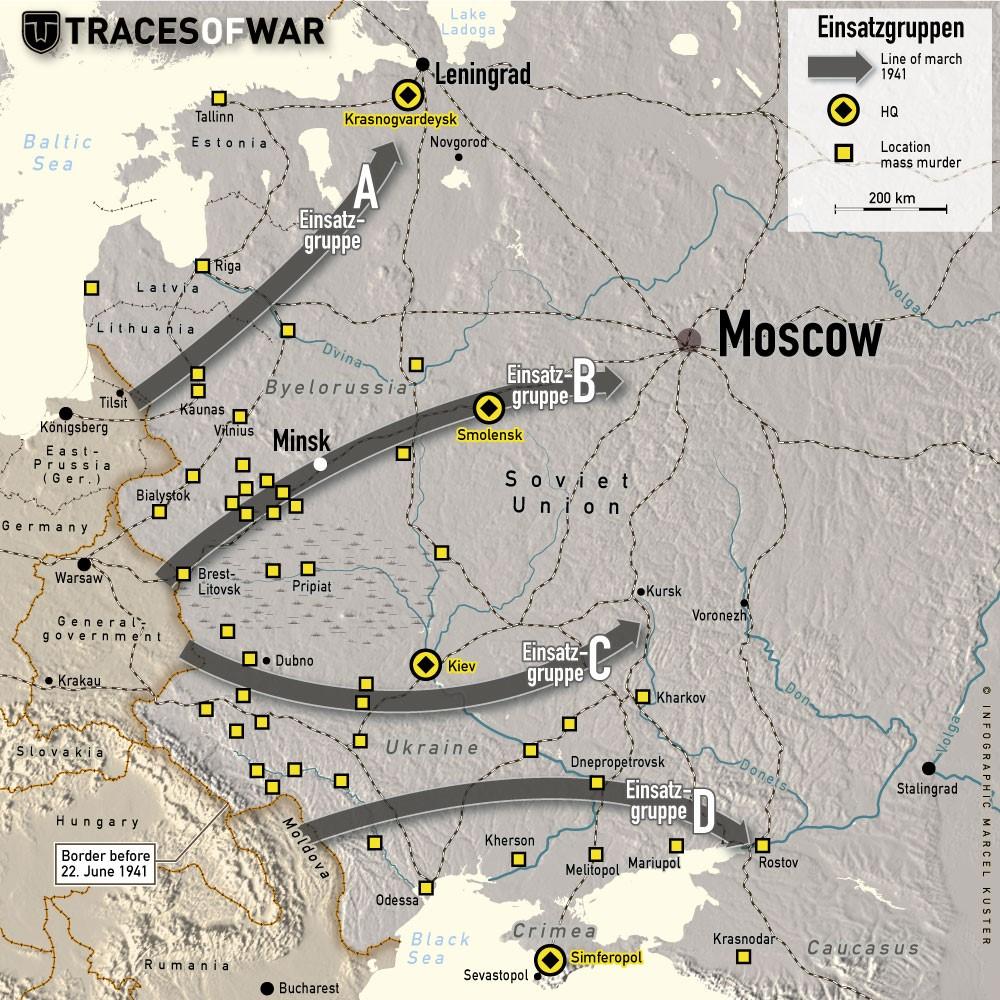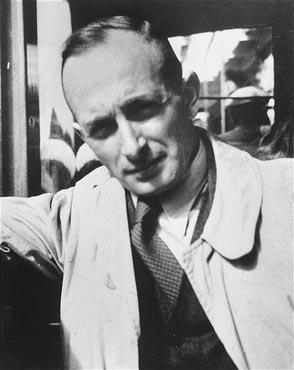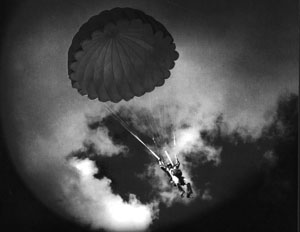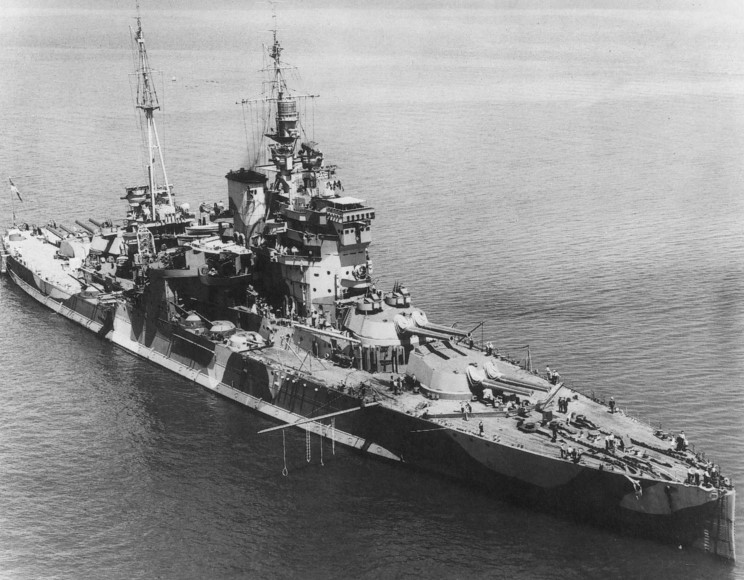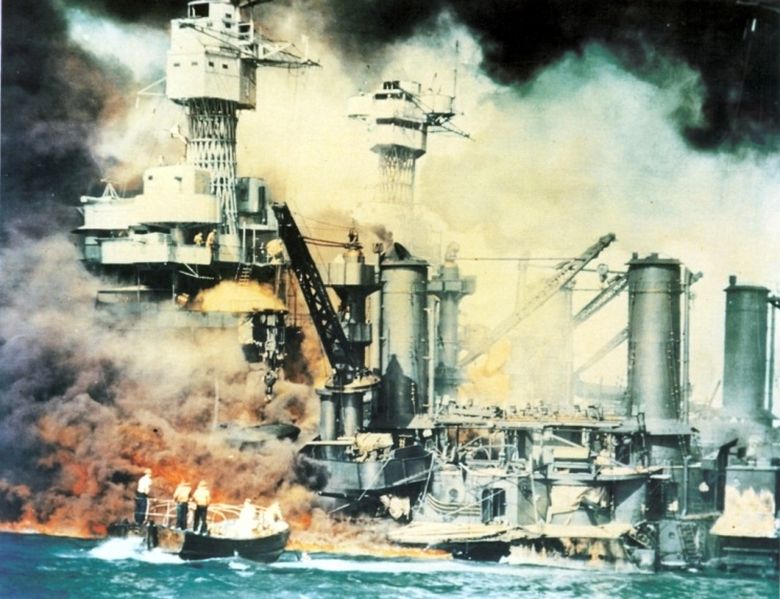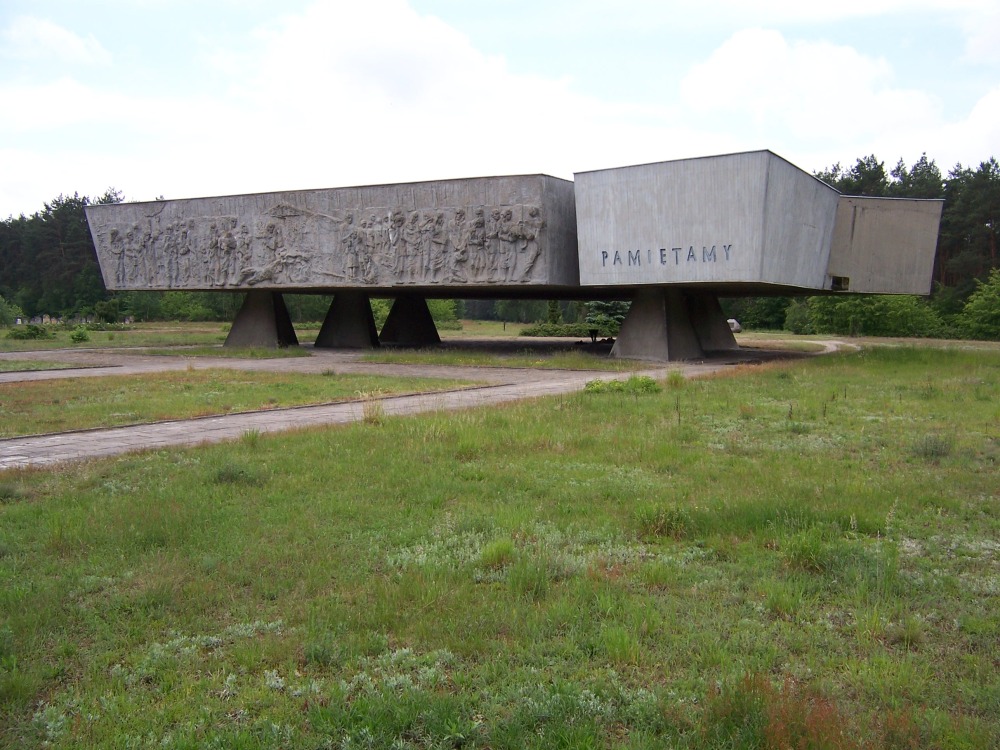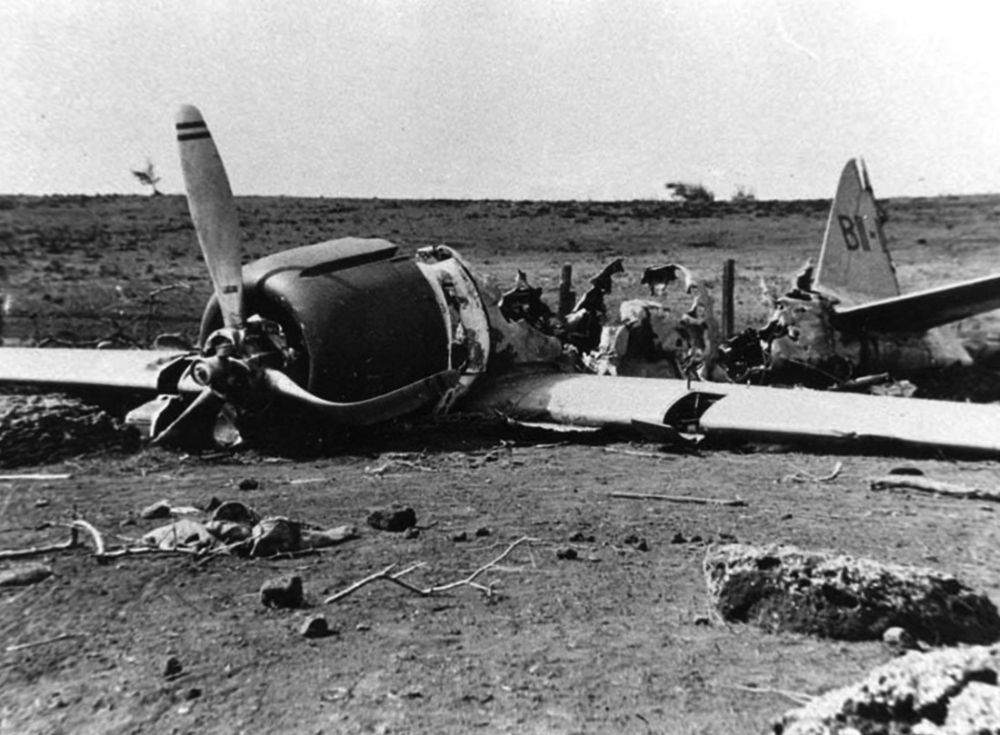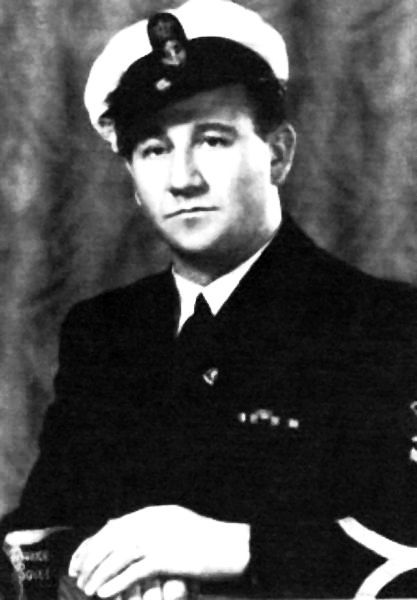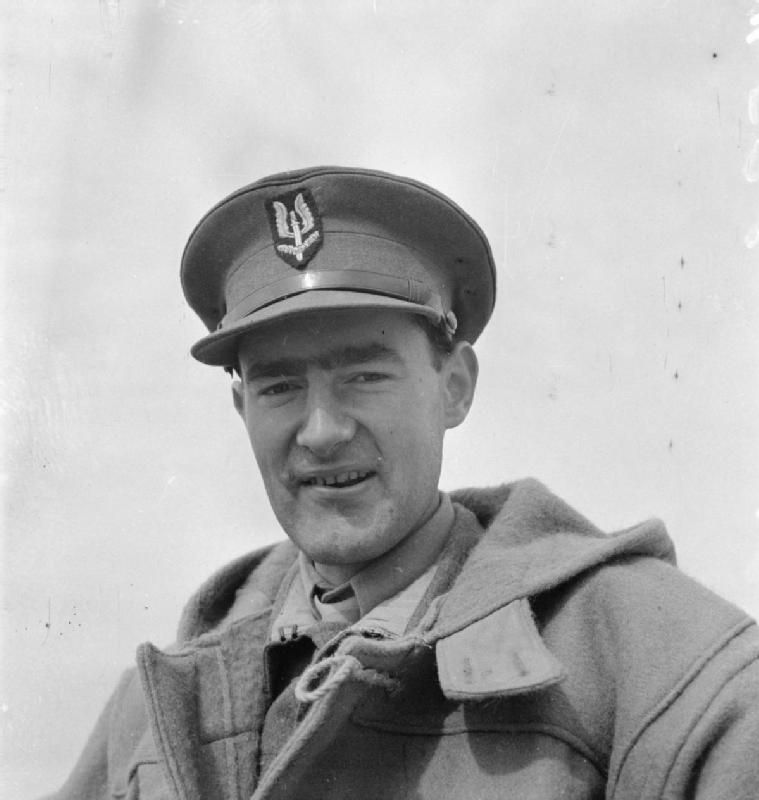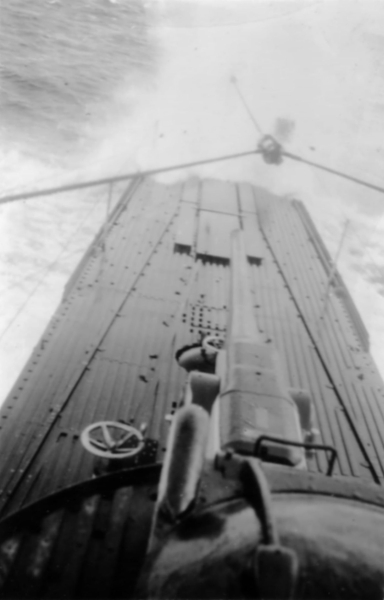-
01-01-1941: The British captain Garrow establishes a new communication network (escape network) Pat.
-
01-01-1941: In his New Year’s speech, Degrelle calls for collaboration. N.V. De Vlijt in Antwerp publishes a new collaborating paper: Het Vlaamsche Land (the Flemish country).
-
03-01-1941: In Albania, Italian troops launch a counter offensive.
-
03-01-1941 - 03-01-1941: Australian and British troops attack Bardia in Cyrenaica. The last Italian troops surrender on January 6.
-
05-01-1941: The Allies enter Libya.
-
06-01-1941: President Roosevelt addresses Congress, proclaiming his "Four Freedoms".
-
07-01-1941: Jews in the Netherlands are banned from visiting cinemas.
-
09-01-1941: Today, the prototype of the AVRO Lancaster bomber makes its maiden flight.
-
10-01-1941: The Netherlands: Weisung 6/1941 by the Reichskommissar pertaining to the registration of all persons of Jewish or partly Jewish descent.
-
10-01-1941: Attack on the British fleet off Sicily.
-
11-01-1941: The Koninklijke Nederlandse Brigade (Royal Dutch Brigade) is established. See August 26, 1941.
-
12-01-1941: Sollum is taken by British forces commanded by General Ritchie.
-
13-01-1941: Pastoral letter by the Dutch bishops in which sole membership of the N.S.B. is declared highly inadmissible.
-
14-01-1941: The Romanian head of state offers Hitler military support.
-
16-01-1941: Japan demands Indonesia joins the Mutual Prosperity Zone in eastern Asia.
-
19-01-1941: The British launch a new offensive in Eritrea. Kassala in the Sudan is occupied.
-
21-01-1941: In Bulgaria, the first anti-Jewish measures are taken.
-
21-01-1941: The Belgian government decides Congo will join the war on the side of the Allies.
-
22-01-1941: Tobruk (Libya) falls in British/Australian hands.
-
22-01-1941 - 22-01-1941: In Romania, the first mass murder on Jews take place.
-
24-01-1941: British forces advance into Abyssinia (Ethiopia).
-
29-01-1941: South-African forces enter Italian Somalia.
-
30-01-1941: Derna in the Cyrenaica falls in British-Australian hands.
-
01-02-1941: In February a Polizeihaft- und Geisellager (camp for prisoners and hostages) is opened in Schoorl.
-
05-02-1941: Appointment of three members of the N.S.B. Commissioner of the Pronce.
-
05-02-1941: Former Prime Minister Mr. D.J. de Geer returns to the Netherlands via Lisbon and Berlin.
-
06-02-1941: The Allies take Benghazi in Libya.
-
06-02-1941: Erwin Rommel is given command of the Deutsches Afrikakorps by Hitler.
-
07-02-1941: Street brawls by members of the W.A. (Weer Afdeling, combat teams of the N.S.B.) and N.S.N.A.P. (Dutch branch of the N.S.D.A.P.) in Rembrandtsquare in Amsterdam.
-
08-02-1941: The U.S. House of Representatives passes the Lend Lease Bill with an overwhelming majority: 260 in favor versus 165 against.
-
09-02-1941: Vichy-France: Pierre Flandrin resigns as Secretary of Foreign Affairs; Amiral Darlan succeeds him.
-
09-02-1941: Members of the W.A. enter café Alcazar on Thorbeckesquare in Amsterdam by force. Fights erupt all over the inner city.
-
09-02-1941: The British capture El Agheila from the Italians.
-
10-02-1941: The British government severs her diplomatic ties with Romania because of the presence of German bases in the country.
-
10-02-1941: British troops cross the border between Kenya and Italian Somalia.
-
10-02-1941: Vichy-France: Amiral Darlan is selected as possible successor to Maréchal Pétain.
-
10-02-1941: The Netherlands: the first issue of the paper Het Parool is published.
-
11-02-1941: In Amsterdam, fighting erupts between Jewish and W.A. strong-arm gangs. Three days later, W.A. man Koot succumbs to his injuries.
-
11-02-1941: U.S.A.: the Senate starts debating the Lend-Lease-Bill.
-
11-02-1941 - 11-02-1941: Böhmker, Beauftragte of the Reichskommissar in Amsterdam, orders the ancient Jewish quarter to be sealed off hermetically.
-
12-02-1941: Soviet general G. Zhukov is named head of the General Staff and Undersecretary of War.
-
12-02-1941: German general Erwin Rommel arrives in Tripoli to prepare for the arrival of the D.A.K. (Deutsches Afrika Korps).
-
12-02-1941: Böhmker demands the establishment of a Jewish council in the Netherlands.
-
13-02-1941: In Amsterdam, the Jewish council is installed, headed by David Cohen and Abraham Asscher.
-
13-02-1941: The newly installed Jewish Council asks the Jews in Amsterdam to hand in their weapons.
-
14-02-1941: The first units of the D.A.K. are put ashore in Tripoli.
-
14-02-1941: South-African troops commanded by General Cunningham capture Kismaju, a port in Italian Somalia.
-
15-02-1941: The Belgian gold supply is taken from Dakar to Berlin via Marseille.
-
15-02-1941: The Netherlands: A numerous clausus is introduced for students of Jewish descent.
-
17-02-1941: In Amsterdam North, metal workers manage by means of a strike to prevent 100 of their colleagues from being sent to Hamburg to do forced labor. In Belgium, thousands of metal workers led by Julien Lahaut, take to the streets as well on occasion of the lowering of wages and the poor food rations.
-
17-02-1941: Turkish-Bulgarian non aggression pact.
-
18-02-1941: Australian units land in Singapore in order to take up defensive positions on the Malaccan peninsula.
-
19-02-1941: Austria: In Vienna, some 10,000 Jews are arrested and deported to Poland.
-
19-02-1941: The Netherlands: In the Coco ice cream parlor on the Van Woustraat in Amsterdam, fighting erupts between W.A. men and Jewish strong-arm gangs.
-
20-02-1941: Romania severs its ties with the Dutch government in London.
-
21-02-1941: In Vichy-France, François Darlan forms a new cabinet.
-
22-02-1941: During a razzia (raid) in Amsterdam, 400 Jews are arrested.
-
22-02-1941: German battle cruisers Scharnhorst and Gneisenau sing five ships in the north Atlantic.
-
22-02-1941: Rommel attacks El Agheila.
-
23-02-1941: The Greek government accepts British support.
-
24-02-1941: The British government decides to send troops to Greece.
-
24-02-1941: A manifesto drawn up by the communist Lou Jansen, calling for a general strike over the arrest of hundreds of Jews, is distributed in Amsterdam and the surrounding area.
-
25-02-1941: Spontaneous strike by the inhabitants of Amsterdam on occasion of the razzias in the Jewish quarter. The illegal C.P.N. (Communistische Partij Nederland) plays an important role in this. Strikes also erupt in the Zaanstreek and the cities of Haarlem, Weesp, Hilversum, Velsen, Utrecht and Muiden.
-
25-02-1941: British forces occupy Mogadishu, capital of Italian Somalia.
-
26-02-1941: According to a British communiqué, German and British motorized patrols have clashed in Libya for the first time.
-
27-02-1941: Belgian Secretary-general for Internal Affairs, J. Vossen refuses to appoint pro-German burgomasters.
-
27-02-1941: The Jewish victims of the razzias on Waterloosquare in Amsterdam are deported to Buchenwald concentration camp. At the end of May, the survivors of this transport are deported to Mauthausen.
-
28-02-1941: Weisung 42/1941 from the Reichskommissar für die besetzten Niederlände pertaining to mandatory labor in Germany for contract breakers and the unemployed.
-
01-03-1941: Bulgarian Prime Minister Bogdan Folov signs the Tri-Partite-Pact in Vienna, joining Bulgaria and the Axis powers.
-
01-03-1941: Himmler inspects Auschwitz concentration camp. He orders camp commander Höss to erect the satellite camp Birkenau in order to house an additional 30,000 inmates.
-
02-03-1941: German troops enter Bulgaria and reach the Greek border.
-
03-03-1941: Japanese army units land on the Chinese coast in the province of Gwangdong on a front 242 miles long.
-
03-03-1941: The first death sentence in the Netherlands is carried out. The owners of the Amsterdam ice cream parlor, where a fight took place on February 19th between W.A. men and a Jewish strong-arm gang, are executed.
-
03-03-1941: The Turkish government denounces the treaties of friendship and non-aggression with Bulgaria.
-
03-03-1941: Generalfeldmarschall Wilhelm Keitel, Chief of the OKW, signs the plan for Operation Barbarossa.
-
04-03-1941: British forces leave for Greece from Egypt.
-
04-03-1941: The Dutch pro-German businessman E.J. Voute is appointed government commissioner of Amsterdam.
-
05-03-1941: Establishment of the Vrijheidsfront (Freedom front) an umbrella organization of a number of Belgian resistance groups.
-
06-03-1941: Communist Leen Schijvenschuurder is executed for his resistance activities during the great strike of February.
-
07-03-1941: In the vicinity of Piraeus and Volos in Greece, 50,000 British troops come ashore.
-
07-03-1941: British troops finalize the capture of Italian Somaliland.
-
07-03-1941: U 47 commanded by Günther Prien, the hero of Scapa Flow is reported missing. The U-boat probably was lost near Rockall Banks in the Atlantic.
-
08-03-1941: Germany and Yugoslavia sign a non-aggression treaty.
-
08-03-1941: U.S.A.: The Senate passes the Lend-Lease Bill; 60 votes in favor versus 31 against.
-
09-03-1941: The existing broadcasting stations lose their air time and are replaced by the Dutch Broadcasting Company.
-
09-03-1941: Italy starts a new offensive against Greece in Albania.
-
10-03-1941: An additional fine of 500 million Reichsmark is imposed on the Netherlands, of which 100 million is to be paid in gold bullion.
-
11-03-1941: Roosevelt signs the Lend-Lease Bill, paving the way for massive shipments of arms to Great Britain.
-
12-03-1941: The R.A.F. bombs the German cities of Kiel, Berlin and Hamburg.
-
13-03-1941: 15 members of the illegal Geuzen movement and three participants in the February strike are executed on the Waalsdorpervlakte in The Hague. Remco Campert wrote a poem about it: "The 18 dead".
-
14-03-1941: In the Netherlands, Jews are banned from taking part in trade and industry.
-
15-03-1941: Turkish president Ismet Inönü informs Hitler his country has no territorial ambitions and is determined to remain neutral.
-
16-03-1941: German battle cruisers Scharnhorst and Gneisenau sink 19 Allied ships.
-
16-03-1941 - 16-03-1941: Heavy bombing attacks on London; some 400 bombers take part.
-
17-03-1941: British colonial forces capture Jijiga in Ethiopia and retake the port of Berbera in British Somalia from the Italians.
-
17-03-1941: In the Netherlands, surrogate coffee is rationed.
-
18-03-1941: For the first time since October, Japanese bombers launch attacks again on the Chinese capital of Tsjongtsjing.
-
22-03-1941: In the Netherlands, the Economic Front is established, an N.S.B. organizations of comrade suppliers.
-
23-03-1941: The entire protectorate of British Somalia is back in British hands.
-
24-03-1941: Heavy fighting between Chinese and Japanese forces rages on the island of Hainan.
-
24-03-1941: German forces commanded by General Erwin Rommel occupy El Agheila in Libya.
-
25-03-1941: Yugoslavia signs the Tri-Partite-Pact and joins the Axis powers.
-
26-03-1941: N.S.B. member M.M. Rost van Tonningen is appointed president of the Dutch National Bank.
-
27-03-1941: Secretary of Foreign Affairs of Japan, Josoeke Matsuoka makes a trip through Germany.
-
27-03-1941: On occasion of the Yugoslav membership of the Axis, a coup d’état takes place. Prince Peter becomes King and Dusan Simovic Prime Minister of a new cabinet.
-
29-03-1941: The British navy scores a massive victory off Cape Matapan: three Italian cruisers are sunk and a battle cruiser damaged, ending the role of the Italian navy.
-
30-03-1941: R.A.F. Bomber Command launches an attack on the German battle cruisers Scharnhorst and Gneisenau in the port of Brest.
-
31-03-1941: The Cuban government confiscates an Italian merchant vessel as a precaution.
-
31-03-1941: The German-Italian counter offensive, commanded by General Rommel is launched in Cyrenaica, North-Africa.
-
31-03-1941: In the air war against Great Britain, the number of German aircraft lost has risen to 2,265.
-
01-04-1941: The foreign currency restrictions between the Netherlands and Germany are lifted.
-
01-04-1941: In April, the first issue of the Sturm SS is published in the Netherlands.
-
01-04-1941: In Belgium V.N.V. (Flemish National Union) member Romsée is appointed Secretary-general of Internal Affairs.
-
03-04-1941: A pro-Nazi regime is installed in Iraq.
-
03-04-1941: Pieter Gerbrandy, the Dutch Prime Minister in exile, gives a radio address to the Dutch people, in which he encourages (spiritual) resistance against the German oppressor.
-
04-04-1941: German troops reach the outskirts of Benghazi in Libya.
-
05-04-1941: The Ethiopian capital Addis Ababa is taken from the Italians by South-African forces.
-
06-04-1941: German forces invade Greece and Yugoslavia.
-
06-04-1941: German battle cruiser Gneisenau is severely damaged by British aircraft in the port of Brest.
-
09-04-1941: Bardia in North-Africa is captured by the German Africa Corps.
-
10-04-1941: The United States occupies Greenland.
-
14-04-1941: The D.A.K. commanded by Erwin Rommel attacks Tobruk.
-
16-04-1941: Yugoslavia surrenders; another victory for the Germans.
-
21-04-1941: In the Netherlands, milk is rationed.
-
21-04-1941 - 21-04-1941: Operation Lustre – a repetition of Dunkirk. Allied troops carry out a fighting retreat from Greece and are evacuated to Crete and Egypt. Various vessels are lost in the process including the troop transports H.M.S. Diamond and H.M.S.Wryneck.
-
23-04-1941: Greece surrenders to Germany.
-
24-04-1941: The Greek government and King George flee to Crete.
-
27-04-1941: The Dutch vessel Slamat, while evacuating Allied troops from Greece is sunk by German bombers. The escorting destroyers carrying many ship wrecked persons, are bombed as well so in the end, only 10 out of the original 198 crew members survive the attack.
-
27-04-1941: The city of Athens is occupied by the German army.
-
28-04-1941: In the Netherlands, potatoes are rationed.
-
01-05-1941: The satellite camp Gross Rosen in Silesia becomes an independent concentration camp.
-
01-05-1941 - 01-05-1941: Allied forces capture Iraq.
-
02-05-1941: The British destroyer HMS Jersey sinks after hitting an Italian mine near the port of Valletta (Malta), 35 crew members are killed.
-
03-05-1941 - 03-05-1941: British and Indian forces attack Italian troops near Amba Alagi in Ethiopia. After heavy fighting, the Italians sue for negotiations to surrender on May 16th.
-
05-05-1941: Haile Selassy, Emperor of Ethiopia, returns to his palace in Addis Ababa after five years in exile.
-
10-05-1941: Rudolf Hess, Hitler’s second man, flies to Scotland in order, as he put it, submit peace proposals. He is arrested by the British.
-
10-05-1941 - 10-05-1941: The last heavy bombardment on London by the Luftwaffe. 400 tons of explosives and 100 tons of incendiaries are dropped.
-
11-05-1941: Hitler, Von Ribbentrop and Amiral Darlan of Vichy-France sign an agreement at the Berghof about German deliveries of arms to Iraq and the use of Syrian air fields by the Luftwaffe.
-
14-05-1941: In Paris, 3,600 Jews are arrested.
-
15-05-1941: Dr. Sigmund Rascher asks Himmler’s permission to conduct medical experiments on inmates of concentration camp Dachau. See also May 31.
-
15-05-1941 - 15-05-1941: Operation Brevity: the first British operation against the Afrika Korps, intended to drive the Axis forces away from the Egyptian border. The Halfaya pass and Sollum are recaptured but Sollum has to be given up again soon after.
-
18-05-1941 - 18-05-1941: Hunt for the Bismarck: on May 18th, the battleship Bismarck and the heavy cruiser Prinz Eugen leave Gdynia and set sail for the Atlantic. The squadron is spotted by the British cruisers H.M.S. Norfolk and H.M.S. Suffolk. On May 24th, the Bismarck engages the British battleship H.M.S. Prince of Wales and the battle cruiser H.M.S. Hood (nicknamed the darling of the navy). H.M.S. Hood is sunk and H.M.S. Prince of Wales damaged. On May 27th, the Bismarck is sunk sank by a British naval squadron. Only 115 out of a total of 2,300 crewmembers of the Bismarck survive.
-
19-05-1941: Definite surrender of Italian troops in Ethiopia with the arrest of the Duke of Aosta and 18,000 soldiers. The British gain control over the Red Sea.
-
20-05-1941 - 20-05-1941: Unternehmen Merkur: a large scale German airborne operation on Crete. Despite heavy losses, the Allies are forced to give up the island. Because of these losses, Hitler prohibits any future airborne operations.
-
21-05-1941 - 21-05-1941: In battles off Crete, the British navy suffers severe losses: four destroyers and three cruisers are lost, one aircraft carrier, three battleships, six cruisers and seven destroyers are damaged, including the destroyer H.M.S. Kelly commanded by Lord Mountbatten.
-
23-05-1941: Amiral Darlan announces Vichy-France will never surrender her fleet and her colonies.
-
24-05-1941: King George of Greece flees from Crete to Egypt.
-
24-05-1941: The English flagship H.M.S. Hood is sunk by the German battle cruiser Bismarck.
-
27-05-1941: Rommel recaptures the Halfaya Pass from the British.
-
27-05-1941: The battle cruiser Bismarck, the pride of the Kriegsmarine, is sunk.
-
30-05-1941 - 30-05-1941: German air raid on Dublin. The Irish government protests and the German government offers compensation for the damage.
-
31-05-1941: Himmler grants permission to Dr. Sigmund Rascher to conduct medical experiments on inmates of concentration camp Dachau. See May 15.
-
04-06-1941: Kaiser Wilhelm II, the last German emperor, dies in Doorn in the Netherlands.
-
04-06-1941: In Iraq, a pro-British cabinet is installed.
-
08-06-1941 - 08-06-1941: Allied troops, including Free French forces, invade Syria and Lebanon from Palestine. Both countries are under Vichy-French rule. In the ensuing war, French fight against French.
-
11-06-1941: In Amsterdam, the second razzia on (rounding up of) Jews takes place.
-
12-06-1941: The Dutch submarine Hr. Ms. O 24 sinks the Italian tanker Fianona in the Gulf of Genoa. This makes the O 24 the first Dutch submarine in World War II to sink an enemy ship.
-
14-06-1941: The Tass press agency denies rumors about an imminent war between Germany and the Soviet Union.
-
16-06-1941: The CID agent Lodo van Hamel is executed by the Germans (see October 15, 1940).
-
17-06-1941: Hitler sets the start of Operation Barbarossa at 03:00 hours on June 22.
-
18-06-1941: In the Netherlands, surrendering metals such as copper and zinc becomes mandatory.
-
21-06-1941: Hitler informs Mussolini by courier about the attack on the Soviet Union.
-
22-06-1941: Operation Barbarossa: Germany and her allies invade the Soviet Union with 151 divisions on a front, 1,790 miles in length.
-
22-06-1941: In an address on B.B.C. radio, Churchill declares: "Any nation fighting National socialism can count on our support. We shall assist Russia in every way possible."
-
23-06-1941: German troops cross the river Bug.
-
24-06-1941: German troops are in Vilnjus and Kanaus.
-
24-06-1941: Bialystok is in German hands.
-
25-06-1941: The Red Air Force attacks targets in Finland.
-
25-06-1941 - 25-06-1941: In the Netherlands, the first hostage action by the Germans against officials and members of the C.P.N. (Dutch Communist Party) takes place.
-
26-06-1941: Minsk is captured by German troops.
-
26-06-1941: The Finns attack on the Ladoga front.
-
26-06-1941: Units of Heeresgruppe Nord cross the river Dvina.
-
26-06-1941: Finland declares war on the Soviet Union.
-
27-06-1941: A British military mission, headed by Sir Stafford Cripps arrives in Moscow.
-
27-06-1941: During a gathering on the grounds of the Ice Club in Amsterdam, Seyss-Inquart delivers a speech on the war in Russia. Mussert delivers a speech as well.
-
28-06-1941: Arnold Meyer, leader on the National (Black) Front suggests establishing a Dutch legion to fight Bolshevists alongside the Germans.
-
29-06-1941 - 29-06-1941: A pogrom in the city of Jassy claims 10,000 Jewish lives.
-
30-06-1941: German troops occupy Lwow (Lemberg).
-
01-07-1941 - 01-07-1941: Launch of a radio program entitled Brandaris for Dutch merchant sailors.
-
02-07-1941: The German heavy cruiser Prinz Eugen is severely damaged during a bombardment on the port of Brest in France.
-
03-07-1941: Stalin delivers his first speech after the German invasion of the Soviet Union.
-
04-07-1941: Members of the Einsatzgruppe z. b. V. kill 21 Polish professors and 13 of their relatives in Lemberg (present-day Lviv) on the orders of SS-Oberführer Karl Eberhard Schöngarth.
-
05-07-1941: In the Netherlands, political parties are banned.
-
07-07-1941: The United States occupies Iceland.
-
10-07-1941: Finland attacks the Soviet Union.
-
11-07-1941: Seyss-Inquart, General Seyffardt and Mussert call on men to join the Dutch Volunteer Legion.
-
12-07-1941: England and Vichy-France sign an armistice for Syria and Lebanon.
-
13-07-1941: Bishop Von Galen delivers his first sermon against the Gestapo.
-
14-07-1941: In the Netherlands, jam is rationed.
-
15-07-1941: Syria and Lebanon are promised home rule by the Allies; Vichy-France protests.
-
15-07-1941: Heeresgruppe Mitte captures Smolensk.
-
18-07-1941: First personal message from Stalin to Churchill, urging for the creation of a second front in the west for the first time.
-
20-07-1941: Bishop Von Galen delivers his second sermon against the Gestapo.
-
21-07-1941: An unofficial order is given for the construction of Camp Majdanek.
-
22-07-1941: Arisierung (Germanization) of Jewish enterprises in Serbia.
-
22-07-1941: Partisan units in Slovenia start armed actions.
-
25-07-1941: H.J. Woudenberg is appointed commissioner for confessional trade unions. The entire leadership of the Roman Catholic Workers Union resigns in protest.
-
25-07-1941: The Dutch episcopacy issues a pastoral letter, protesting against the equalization of the union mentioned above.
-
25-07-1941: Japan occupies French Indo-China (the present Vietnam and Cambodia).
-
25-07-1941 - 25-07-1941: Pogroms in Lithuania claim the lives of 3,800 Jews.
-
26-07-1941: In the Netherlands, the wearing of Union badges and distribution of propaganda material is prohibited.
-
26-07-1941: The Polizeiliches Durchgangslager (Transfer camp) Amersfoort is opened.
-
26-07-1941: Joseph Goebbels gives a speech at the opening of the Great German Art Exhibition at the Haus der Deutschen Kunst.
-
27-07-1941: The Netherlands: vice-Admiral J.Th. Fürstner is appointed Secretary of the newly established Department of the Navy.
-
28-07-1941: Bessarabia is occupied by German and Romanian troops.
-
29-07-1941: Stalin fires his most favorite general Zhukov for the first time.
-
30-07-1941: The American envoy Harry Hopkins arrives in Moscow in order to discuss American aid to the U.S.S.R. with Stalin.
-
31-07-1941: Göring orders Heydrich to prepare for the "Endlöung der Judenfrage," (Final solution of the Jewish question).
-
01-08-1941: The U.S. impose an oil embargo on all belligerent nations.
-
01-08-1941: Partisans capture areas in Croatia and in the western and eastern part of Bosnia.
-
01-08-1941: In the western Ukraine, Bandera partisans are arrested in masses.
-
01-08-1941: Poliziehaftlager (Detention camp) Compiègne is opened in France.
-
02-08-1941: The first U.S. shipments under the Lend-Lease Agreement arrive in the Soviet Union.
-
03-08-1941: Graf von Galen, Bishop of Münster, delivers a sermon against the wide spread euthanasia on the mentally disabled.
-
07-08-1941: Stalin is appointed Commander-in-Chief of the Red Army.
-
08-08-1941: The first volunteers of the Wallonian Legion of Léon Degrelle leave for the eastern front.
-
09-08-1941: The famous British pilot Douglas Bader crashes over Northern France after his Spitfire collides with another plane. He is taken prisoner by the Germans.
-
09-08-1941 - 09-08-1941: President Roosevelt and Winston Churchill have their Atlantic conference and announce the Atlantic Charter.
-
10-08-1941: Great Britain and the Soviet Union promise aid to Turkey.
-
15-08-1941: Vichy-France severs her diplomatic ties with Yugoslavia.
-
16-08-1941: German forces take Novgorod.
-
16-08-1941: A trade and credit agreement is signed between the United States and the Soviet Union.
-
20-08-1941: The Germans begin their siege of Leningrad.
-
20-08-1941: Chudovo is in German hands. The railway line between Leningrad and Moscow is cut off.
-
21-08-1941: German armored forces stand 24.8 miles short of Leningrad.
-
25-08-1941: The Soviets abandon Novgorod.
-
25-08-1941: A state of war exists between Persia and Great Britain and the Soviet Union.
-
26-08-1941: By Royal Decree, the Royal Dutch Brigade (Koninklijke Nederlandse Brigade) is renamed Koninklijke Brigade Prinses Irene.
-
28-08-1941: During a bombing raid on the port of Rotterdam, no fewer than 7 of the 16 bombers and 3 of the escorting fighters are shot down.
-
29-08-1941: Wiborg is in Finnish hands. The Soviets abandon the Karelian isthmus.
-
29-08-1941: Establishment of the Armée Juive (Jewish Army) commanded by Abraham Polomski.
-
31-08-1941: The arrest of Dutch radio operator Hans Zomer by the Germans.
-
01-09-1941: Jews are rounded up in Arnheim and Enschede.
-
03-09-1941: First experiments using Zyklon-B on Russian prisoners-of-war in Auschwitz.
-
04-09-1941: The American destroyer U.S.S. Greer is attacked by a U-boat. Roosevelt issues the "shoot on sight" order.
-
04-09-1941: Finnish forces reach their pre-war defensive lines.
-
08-09-1941: Leningrad is sealed off completely by Heeresgruppe Nord.
-
09-09-1941: General von Leeb launches a frontal attack on Leningrad. The city has to be captured, whatever the cost.
-
11-09-1941: Ordered by Stalin, Zhukov replaces General Vorosilov as commander of the forces in Leningrad. He will stabilize the front.
-
16-09-1941: Generalfeldmarschall Keitel issues an order to execute 50 to 100 Soviet prisoners-of-war- for every German soldier killed in reprisal against partisan actions.
-
17-09-1941: Start of the general deportation of German Jews.
-
19-09-1941: Kiev is occupied by the Germans. In this sector they take some 650,000 Soviets prisoners-of-war.
-
19-09-1941: In Germany, all Jews from age six and up are obliged to wear the yellow star of David. They are not allowed to leave their home town without permission from the police.
-
21-09-1941: The Germans dig in around Leningrad.
-
21-09-1941: The local chiefs of the Gestapo are instructed by Heydrich how to concentrate Jews in ghettos
-
22-09-1941: Japan occupies a few points of support in French Indochina.
-
23-09-1941: Establishment of the Comité National Français (National French Committee) by General de Gaulle.
-
29-09-1941 - 29-09-1941: In Kiev, 34,000 Jews are murdered.
-
29-09-1941 - 29-09-1941: The first Moscow Conference takes place.
-
01-10-1941: An Anglo-American committee led by Lord Beaverbrook and Averell Harriman has agreed in Moscow to increase military support to the Soviet Union in 1942. This agreement is confirmed by Washington and London on October 4.
-
01-10-1941: In Serbia, Jewish males are arrested and executed in masses.
-
01-10-1941: The Gypsy ghetto in Belgrade is formed.
-
01-10-1941: German forces land behind the Soviet lines in gliders.
-
01-10-1941: Finnish forces capture Petrozovodsk west of Lake Onega.
-
01-10-1941: In Vilnjus, Lithuania, 3,000 Jews are rounded up and executed in the Ponary forest.
-
02-10-1941: Operation Typhoon is launched. The main objective is the capture of Moscow and the Sea of Azov in the south. The plan entails trapping the Soviet forces in two pockets, one at Vyasma and the other at Briansk.
-
02-10-1941: Near Zagare in Lithuania, SS-Einsatzkommandos murder 2,146 Jews with machine guns.
-
03-10-1941: Hitler delivers a premature victory speech: "The enemy in the east has been destroyed."
-
03-10-1941: In Paris, six synagogues are blown by Nazi sympathizers.
-
03-10-1941: German troops capture Charku Selo near Leningrad and the industrial center of Orel.
-
03-10-1941 - 03-10-1941: During a bombardment by the R.A.F. of the port of Rotterdam, over 100 people are killed by bombs, inadvertently dropped on residential areas.
-
04-10-1941: After growing unrest and revolts, the Germans warn the Norwegian population to cooperate or else face famine.
-
04-10-1941: In Vichy-France, Maréchal Pétain amends the death penalty of Paul Colette – who had tried to make an attempt on Pierre Laval and Marcel Deat – to life imprisonment.
-
04-10-1941: In Vichy-France, Maréchal Pétain imposes mandatory membership of a uniform trade union on all laborers.
-
05-10-1941 - 05-10-1941: Battle for the Sea of Azov.
-
06-10-1941: The German 2. Armee and 2. Panzergruppe close the Briansk pocket; three Soviet armies are surrounded.
-
06-10-1941: Labour leader John Curtiss forms a new Labour cabinet in Australia and becomes Prime Minister himself.
-
07-10-1941: The German 3. and 4. Panzergruppe close the Vyasma pocket; six Soviet armies are surrounded.
-
07-10-1941: In Rovno, Poland, 17,000 Jews are shot.
-
07-10-1941: Finland refuses to give in to Allied pressure to stop the war against the Soviet Union.
-
07-10-1941: Paul Blobel reports on the executions in Babi Jar of 33,771 Jews by Sonderkommando 4a.
-
07-10-1941 - 07-10-1941: Onset of the rasputiza (autumn rain) at the eastern front. The mud severely slows the German advance.
-
07-10-1941 - 07-10-1941: By closing the Vyasma and Briansk pockets, 673,000 soviet soldiers and 1,245 tanks are trapped. This slows the German advance and offers the Soviets the opportunity to reinforce their defense.
-
08-10-1941: Beginning of the construction of German concentration camp Birkenau in occupied Poland.
-
08-10-1941: In China, Chinese troops reach Yuezhou and in so doing end the second battle for Changsa.
-
09-10-1941: Turkey signs a trade agreement with Germany to deliver raw materials in exchange for spent products.
-
10-10-1941: General Zhukov takes charge of the defense of Moscow.
-
11-10-1941: In Pripep, the Macedonian population starts an armed revolt with partisan actions.
-
11-10-1941: The Soviet T34 tank sees action for the first time on the Moscow front.
-
12-10-1941: SS-Standartenführer Martin Sandberger, the commander of Sonderkommando 1A, reports that 440 Jews have been executed in Estonia up to that date.
-
12-10-1941 - 12-10-1941: The R.A.F. unleashes its first massive bombardment on Nuremburg.
-
12-10-1941 - 12-10-1941: The Australian garrison in besieged Tobruk is relieved by the British 70th Infantry Division arriving by sea. During this operation, at least one vessel, the minelayer H.M.S. Latona is lost.
-
13-10-1941: Kalinin is occupied by the Germans.
-
13-10-1941: The commander of the Indonesian Army, Lieutenant-general G.J. Berenschot looses his life in an aircraft accident. General-major H. ter Poorten succeeds him.
-
14-10-1941: The battle in the Vyasma pocket comes to an end.
-
14-10-1941: Start of the first mass deportation from Germany to Kovno, Lodz, Riga and Minsk.
-
15-10-1941: Evacuation of the Soviet government and the Corps Diplomatique to Kujbishev. Stalin remains in Moscow.
-
15-10-1941 - 15-10-1941: The Soviets abandon Sevastopol.
-
16-10-1941: German and Romanian troops enter Odessa, The last Soviet troops escape by sea a few hours earlier.
-
16-10-1941: Over half a million men, women and children complete the new defensive belt around Moscow.
-
16-10-1941: First deportation of Jews from the Protectorate of Bohemia-Moravia to the extermination camps.
-
16-10-1941: Japans’ Prime Minister Prince Fumimaro Konoye resigns.
-
17-10-1941: In Uzice, Serbia, the committee for the liberation of the population is established.
-
17-10-1941: U.S.S. Kearny is torpedoed by U 568. The heavily damaged vessel does not sink but limps into Reykjavik harbor. There are 11 casualties. She is the first American warship to be hit.
-
18-10-1941: General Hideki Tojo, Japan’s Secretary of War is appointed the new Prime Minister. This considerably increases the chances of war.
-
19-10-1941: Taganrog on the Sea of Azov falls in German hands.
-
19-10-1941: Troops from Siberia and the Far East arrive in Moscow.
-
19-10-1941: The American merchant vessel Lehigh is torpedoed by a U-boat off the west coast of Africa.
-
20-10-1941: Stalin declares a state of siege for Moscow.
-
20-10-1941: The battle in the Briansk pocket comes to an end.
-
20-10-1941 - 20-10-1941: In Nantes, France, the local German commander, Lieutenant-colonel Karl Holz is assassinated by resistance fighters. The next day, 50 hostages are executed by the German in reprisal.
-
21-10-1941: Near Kragujevac, Serbia, 2,300 Serbs are butchered by Germens and members of the local fascist militia in reprisal for partisan attacks.
-
21-10-1941: In Bordeaux, France, 100 people are taken hostage and a curfew is imposed following the death of a German officer during a raid.
-
22-10-1941: In Odessa, Russia, the Romanian commander General Glugociano and 50 members of his staff are killed in a bombing attack. 5,000 Jews are butchered in and outside the city in reprisal.
-
23-10-1941: In Berlin, the dean of the Hedwig Cathedral, Bernard Lichtenberg, is arrested by the Gestapo for his many protests against the government.
-
23-10-1941: Establishment of the Dutch Landstand.
-
23-10-1941: The Soviet command structure is reorganized: Zhukov is made responsible for the northern sector, Timoshenko for the southern.
-
23-10-1941: In London, General de Gaulle asks the French resistance to stop raiding German military personnel in order to prevent further retaliations against the French population.
-
24-10-1941: Kharkov is taken by German troops.
-
24-10-1941: Adolf Eichmann approves a scheme to gas Jews using exhaust gasses of specially designed trucks.
-
24-10-1941: In Bordeaux, France, 50 hostages are executed.
-
25-10-1941: Churchill condemns German retaliatory executions in occupied areas.
-
25-10-1941: British flag ship H.M.S. Prince of Wales departs from England, destination Singapore in order to become the nucleus of the new British Far East Fleet.
-
26-10-1941 - 26-10-1941: The R.A.F. launches a night attack on Hamburg by 115 aircraft.
-
27-10-1941: The Germans capture Kramatorsk.
-
27-10-1941: The German achieve a break through on the Crimea and reach Sevastopol.
-
27-10-1941: In Kalisz, Poland, during a first test, 290 Jews from a home of the elderly are gassed with exhaust gasses in a specially designed van.
-
28-10-1941: General Guderian launches a new attack on Moscow which bogs down in the mud.
-
29-10-1941: SS-Einsatzkommandos murder 9,200 Jews, including 4,273 children near Kovno in Lithuania.
-
30-10-1941: German forces suspend their attacks on land on Moscow in order to wait for the terrain to dry up and harden.
-
30-10-1941: U.S. President Roosevelt grants the Soviet Union a loan of $ 1 billion free of interest, to enable her to buy equipment under the Lend-Lease Act.
-
31-10-1941: West of Iceland, the American destroyer U.S.S. Reuben James is torpedoed by U 552. 115 out of her crew of 160 perish. She is the first American battleship to be sunk.
-
31-10-1941: The Luftwaffe bombs Moscow in 45 waves.
-
01-11-1941: Sinferopol falls in German hands.
-
01-11-1941: All Serbian women and children, some 15,000 are herded together in camp Zemlin. From there, they will gradually be deported to the east.
-
02-11-1941: Attack by Cetnicks in collaboration with the occupier on partisan units near Uzice in Serbia. This is the beginning of an unyielding civil war in Yugoslavia.
-
04-11-1941: Troops commanded by General Guderian capture Kursk.
-
04-11-1941: The Germans capture Feodosia.
-
06-11-1941: Stalin delivers a speech on occasion of the October revolution. He calls on the love for Mother Russia of the inhabitants of the Soviet Union.
-
07-11-1941: Stalin delivers a speech during the parade of the Red Army on the Red Square in Moscow: "Our country has faced grave dangers in the past. Long live our victorious home land; behind Lenin’s banner onwards to victory."
-
07-11-1941: SOE agents Huub Lauwers and Thijs Taconis are dropped near Ommen.
-
08-11-1941: Göring announces mandatory employment of Russian civilians and prisoners-of-war in Germany.
-
09-11-1941: Tichvin is captured by German forces; all but closing the ring around Leningrad.
-
09-11-1941: Yalta falls in German hands.
-
15-11-1941: Start of the second phase of Operation Typhoon.
-
16-11-1941: The Germans take Kerch.
-
16-11-1941: Iraq severs her diplomatic ties with Vichy-France.
-
17-11-1941: British commandos attack Erwin Rommel's headquarters in Beda Littoria (Libya). The attack failed due to fierce German defenses and weather conditions. Rommel also appears not to be present. Of the participating commandos, only three eventually reach their own lines. The rest are killed or taken prisoner.
-
18-11-1941: Launch of Operation Crusader, the second large scale action in the North-African desert by the British 8th Army.
-
19-11-1941: The light cruiser HMAS Sydney is sunk during an encounter with the German auxiliary cruiser Kormoran. All 645 crew members are killed. The Kormoran is so damaged after the battle that the captain orders the ship to be abandoned.
-
19-11-1941 - 19-11-1941: British troops reach Sidi-Rezegh. Here a fierce tank battle erupts, ending in defeat for the British.
-
20-11-1941: Dr. H.J. Mook becomes the Dutch Secretary for the Colonies.
-
21-11-1941: The Germans occupy Rostov. The Soviets launch a counter offensive.
-
22-11-1941: Establishment of the Dutch Kulturkammer (Chamber of Culture). Membership is voluntary for the time being.
-
24-11-1941: First transport from Bohemia-Moravia to Theresienstadt where a so called Vorzugslager (Preferential camp) is established.
-
25-11-1941: In a memorandum from Cordell Hull, U.S. Secretary of Foreign Affairs, the United States repeats her demands for a mutual agreement.
-
25-11-1941: The British battleship HMS Barham is torpedoed in the Mediterranean by U-331. 862 were killed.
-
27-11-1941 - 27-11-1941: The Germans abandon Rostov and withdraw.
-
28-11-1941: The Dutch submarine Hr. Ms. O 21 sinks the German U-95 in the Mediterranean.
-
28-11-1941: Hitler has a meeting with Grand Mufti Amin al-Husseini.
-
30-11-1941: Military aviation in the Dutch East-Indies is mobilized.
-
30-11-1941: A motor patrol of the German 2. Panzerdivision pushes through to the suburb of Kimki at 5 miles from Moscow.
-
30-11-1941: In the Netherlands, cacao is put on ration.
-
01-12-1941: The Japanese Crown Council takes the irrevocable decision to wage war against the United States.
-
05-12-1941: A Soviet offensive west of Moscow pushes the Germans back along a broad front.
-
07-12-1941: Unexpected Japanese attack on the U.S. Pacific Fleet at Pearl Harbor.
-
07-12-1941: British troops in Tobruk are finally relieved.
-
08-12-1941: Landing of Japanese troops on Guam and Bataan. Other units enter Thailand.
-
08-12-1941: Establishment of the Chelmno extermination camp in Poland.
-
08-12-1941: Hitler temporarily suspends the fighting on the eastern front. German troops are forced onto the defensive.
-
08-12-1941: The United States and Great Britain declare war on Japan.
-
08-12-1941: President Franklin Roosevelt gives a speech on the occasion of the Japanese attack on Pearl Harbor.
-
09-12-1941: China declares war on Germany, Italy and Japan.
-
09-12-1941: The Red Army captures Tikhvin, Leningrad remains in Soviet hands.
-
10-12-1941: H.M.S. Prince of Wales and H.M.S. Repulse, sister ship of H.M.S. Renown, are sunk by Japanese aircraft in the South-Chinese Sea with the loss of 840 crew members. This attack is considered the end of the era of the battleship
-
11-12-1941: Japanese troops cross the border between Siam (Thailand) and Burma.
-
11-12-1941: Italy and Germany declare war on the United States.
-
12-12-1941: Second visit of Anton Mussert to Hitler. He pledges his oath of alliance as Germanic Führer.
-
13-12-1941: An Allied destroyer flotilla, consisting of the British destroyers H.M.S. Sikh, H.M.S. Legion, H.M.S. Maori and the Dutch H.M. Isaac Sweers sink the Italian cruisers Alberico de Barbiano and Alberto da Giussano off Cape Bon in the Mediterranean.
-
13-12-1941: Japanese pilot Shigenori Nishikaichi, whose plane crashed on the island on December 7, 1941, is killed in a confrontation with local residents on the Hawaiian island of Niihau.
-
14-12-1941: Celebration of the 10th anniversary of the N.S.B. in Utrecht. The Nederlandse Unie, the Nationaal Front and the N.S.N.A.P. are disbanded.
-
14-12-1941: Hitler orders the O.K.W. to work out plans for the construction of a wall (the Atlantik Mauer) on the coast of the Atlantic and the North Sea to the north of Norway as a protection against an Allied invasion.
-
15-12-1941: The Dutch submarine Hr. Ms. O 16 hits a mine in the South China Sea and sinks. Only one of the 42 crew members survives, Quartermaster Cor de Wolf.
-
16-12-1941: Landing of Japanese units in British Borneo.
-
16-12-1941: Rommel withdraws his forces as German troops near El Gazala are threatened with encirclement.
-
16-12-1941: U.S.S. Swordfish (SS 193) is the first American submarine to sink a Japanese merchantman, the Atsutasan Maru.
-
18-12-1941: Landing of Japanese units on British Borneo.
-
19-12-1941: Hitler takes supreme command of the army; Von Brauchitsch is forced to resign.
-
19-12-1941: During a confrontation with the Japanese destroyer Uranami, the commander of the Dutch submarine Hr. Ms. O 20 the signal to leave the ship. 32 crew members are rescued by the Japanese, 7 people, including the commander, are killed.
-
20-12-1941: Japan starts the conquest of the Philippines with a landing on the island of Mindanao.
-
20-12-1941: Three SAS groups carry out attacks on the Libyan airfields of Sirte, Tamet and Agedabia. They succeed in destroying dozens of aircraft.
-
21-12-1941: The Dutch submarine Hr. Ms. K XVII hits a mine in the South China Sea and sinks. All 36 crew members are killed.
-
22-12-1941: Japan captures Luzon in the Philippines.
-
22-12-1941: The British escort carrier HMS Audacity is sunk 500 nautical miles west of Cape Finisterre by U-751. 73 of the approximately 500 crew members are killed.
-
23-12-1941: General MacArthur abandons Manila without a fight and withdraws the American troops to Bataan.
-
24-12-1941: The American island of Wake falls in Japanese hands.
-
24-12-1941: British units enter Benghazi; Rommel is forced to withdraw his troops beyond the El Agheila positions.
-
25-12-1941: Hong Kong surrenders to Japan.
-
26-12-1941: Manila is declared an open city.
-
26-12-1941 - 26-12-1941: The British launch commando raids on the islands of the Lofoten group and on the island of Vaagso, all in Norway. The intention is to lure the Germans into thinking the British are preparing for an invasion of Norway.
-
27-12-1941: Japanese bombing attacks on Manila.
-
29-12-1941: The Allies establish the ABDACOM (American-British-Dutch-Australian Command), under the command of the British General Sir Archibald Wavell. Its task is to defend the Malay barrier.
-
30-12-1941: The Indian Congress promises Great Britain its support in the war against Japan.
-
30-12-1941: Kaluga is recaptured by the Soviets.
-
31-12-1941: At the close of 1941, the United States dispatches 2,000 troops in order to protect the oil refineries on the Antilles and the bauxite mines in Surinam.
